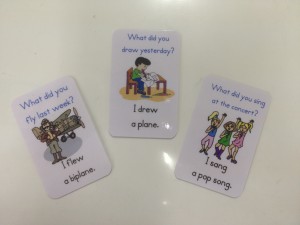curriculum expectations extensive listening extensive reading Language learning online resources personal Thai theory
by sendaiben
leave a comment
Thai (lack of) progress
Okay, so we are now two months into 2012, and my Thai study is going nowhere very slowly.
This has been a very interesting exercise for me, both from a learning point of view, and as a way to test out my theories regarding how best to study a language. Now, it has been very clear to me from observing my students that learning preferences and habits are extremely personal and vary widely among individuals. Some of my students take to internet drills, some like reading, some spend hours writing journals, and some, despite my best efforts, do nothing.
I am definitely not a self-directed learner. I like the idea of input, but at the end of the day I need the structure and encouragement provided by a teacher, a class, or by actually living in a foreign language environment.
Come to think of it, I have done all my language learning under one or more of those conditions. This is the first time for me to try to learn a language on my own, outside of a place where it is spoken. It is not going well.
There are many examples of successful language learners who have succeeded under similar conditions. Khatsumoto for Japanese, or Steve Kaufmann for all sorts of languages. They rely on masses of input, supplemented with judicious use of SRS (spaced repetition system online flashcard applications). I completely agree with the approach, and see great results from those of my students that follow my advice. So what’s my problem?
I have been listening to the Learn Thai Podcast materials, which are pretty good, but in all fairness are nowhere near adequate to take me to Thai language mastery. I need a foundation of basic phrases to provide a base, then a huge amount of input supplemented by the ‘teaching’ in the podcasts, as well as conversation practice/tutoring once I get a bit better.
I have three fairly serious issues I need to overcome first:
1. I can’t read Thai yet. This is a huge hurdle because it is preventing me from getting input through reading (probably the best way to get lots of input fast)
2. I haven’t found good sources for input (radio, videos, music)
3. I haven’t found anyone to help me with Thai or hold me accountable for (not) studying
It’s fairly clear what I need to do. I need to learn Thai phonics and the alphabet. I need to find videos, TV, and music that I like and make sure I spend a chunk of time each day with it. And I am going to need a teacher or class to keep me focused. That last point is particular to me. I tend to get distracted and lose interest in things, so I need an external motivator to help me.
Okay, round two. I’ll keep you posted.
EFL eikaiwa ES kids language courses Language learning levity materials speaking teaching vocabulary
by sendaiben
6 comments
David Lisgo’s new card games
I am a big fan of David Lisgo‘s work, especially the Switchit card game.
Recently he has made a new set of card games based on verbs. Unlike Switchit, which is similar to UNO, these are more like a combination of Go Fish and Happy Families or Rummy.
Play is simple: players are dealt a number of cards and they try to collect sets of four by asking other players: if the other player has the cards, they hand them over; if not, the asking player takes a card from the middle (like Go Fish). Play continues until all the cards are gone or the time is up.
One caveat is that the game if played in full can take a long time: I have found setting a time limit or removing cards or sets from the deck helps speed things up.
Our students enjoyed the new game and I liked it very much as well. Students are talking a lot more, using full sentences, and getting a lot of practice with verb forms. These cards are a great addition to a teacher’s toolbox.
blogging curriculum EFL evaluation expectations Language learning teaching testing theory
by sendaiben
leave a comment
Are we stealing dreams?
Seth Godin, who is an internet/new media/publishing/idea guru, just published a manifesto aimed at starting (or continuing) a conversation about the future of education. Very much in the same vein as Ken Robinson’s famous TED talk on the same subject, Stop Stealing Dreams (what is school for?) is a 30,000 word ebook that is currently available for free. Based on his previous work, it’s probably worth your time.
apple curriculum EFL language courses Language learning online resources technology textbooks
by sendaiben
5 comments
Apple Education
Reading about the new Apple educational push, I was pretty impressed. It seems like they ‘get’ the core issues:
1. textbooks need to be interactive and appealing, and take advantage of pictures, video, and audio
2. textbooks need to be affordable
3. teachers want to make these next-generation textbooks
Their iBook author app looks extremely interesting. Interesting enough to make me look up the price of new Apple laptops…
Perhaps that was the secret agenda ^-^
expectations language courses Language learning online resources personal
by sendaiben
leave a comment
2011 and all that
Happy New Year! I for one am sincerely hoping that 2012 will bring good things.
Last year was one of the toughest I have faced, even more than some very hard teenage years. While the emotional suffering wasn’t up there, I can definitely say that physically and mentally 2011 was the hardest year of my life. I am very happy to see the back of it. I have always subscribed to the ‘whatever doesn’t kill me makes me stronger’ philosophy, but after the latter nine months of last year I think there is an alternative interpretation, ie ‘whatever doesn’t kill me makes me very tired and unwilling to do anything’. You may have noticed the distinct lack of blog posts towards the end of the year.
Partly in an effort to put all that behind me, I have a few New Year goals (I hesitate to call them resolutions as that seems to jinx things). One of them is to learn Thai this year, studying by myself using online resources. I’ll report back on my progress throughout the year and hopefully it will give me a new perspective on language learning (I have been lucky enough to learn most of my languages in context, by living there, so this is new). I foresee issues with motivation and consistency, but this is something I have always wanted to do so we’ll see how far I can get in a year.
I’ll be using material from Learn Thai Podcast, in case anyone is interested. They seem pretty good so far (full review later).




